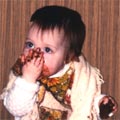Feeding Jessica and Tyler
Did you know?
Usually the first food introduced to an infant is rice cereal. This is least likely to cause an allergic reaction or any other problems.
Tyler has started to calm down a bit, but he is still not happy. The problem may be something other than anxiety. Maybe Tyler is hungry.
Feeding Tyler
Read through the resource below for ideas on the best foods to feed Tyler. Remember that he is 18 months old. Clicking on each of the ages will open up the information for you to read.
0 – 6 months

For the first 6 months, all a baby drinks is milk. The milk may be breast milk or infant formula. If the day is really hot, and the child is perspiring, you may need to offer more than the usual amount of breast or bottle feed.
Breast milk may be expressed by the mother using a pump or the mother may be close enough to be able to come to the child care centre and feed the baby. A quiet, comfortable and private place, if the mother wishes, should be available for breastfeeding. Expressed breast milk stored in bottles can be labelled and given to the child later.
However if you are concerned about the child's food intake speak with the parents. If the parents are concerned, suggest consulting the local Infant Welfare Nurse or the family doctor.
As a caregiver you will find that individual children have individual needs. The feeds required by the infant can range from 4 to 7 feeds a day, some of which will occur while you are caring for them.
6 - 8 months

Between 6 and 8 months of age, the infant will begin to eat solids. What they eat and when they begin will vary between individual children and will depend on how their bodies react and what their needs are.
Usually the first food introduced to an infant is rice cereal. This is least likely to cause an allergic reaction or any other problems. A variety food is gradually introduced so that the baby's reactions can be noted.
Infants will still consume breast or formula milk, but the amount of milk that they drink will start to decrease as they begin to eat more solids.
8 - 12 months

Between 8 and 12 months the amount of breast milk or formula milk may be further reduced, and may not be wanted as often by the child.
At this age, they are starting to eat more solid food.
They will still need milk, but not as much as they did during the first 6 months of their life.
12 - 24 months

At this age, food preferences start to develop. The child may become a fussy eater or not eat as much. Usually, children will eat what and when they need. However, if you or a family member feels concerned, consult your local Health Nurse or doctor.
During this period, children learn to feed themselves. This means they need lots of opportunities to explore and handle a variety of foods and utensils, even though this will be messy. Adults need to support the child's learning by giving them plenty of opportunity to practise. Adults also need to model for children the ways in which we eat. This may mean eating with the children. Children need lots of practice, support and carer patience while they gain the skills to use cutlery and cups.
Breast milk or formula

Some babies are fed formula milk. Parents may choose formula so they can share the feeding role. There are many other reasons people choose either breast or formula milk. It is a personal choice for the family and carers should be careful not to judge them and their choice.
Formula milk is made to closely resemble breast milk. There are many different varieties available. You should keep up to date with new formulas that become available.
When preparing formula, you must read the instructions very carefully and follow them exactly. It is important to make up the formula correctly according to the directions.
When you were a baby, were you breastfed or bottle-fed using a formula? What are the benefits of breastfeeding?
How can you support each family's decision to use breast or formula milk? (Remember, not all families will choose to or be able to breastfeed their baby).
Write your ideas in your notebook.
Okay, what shall we feed Tyler? Choose the most suitable foods and drinks to feed to Tyler from those shown below.
Feeding Jessica
Jessica will soon be ready for feeding too. At 6 months of age, she eats different foods to Tyler. Her main diet is milk. Jessica's mother used to work nearby, so she was able to come in and feed her daughter herself throughout the day. Now she expresses breast milk for carers to feed to Jessica using a bottle.
Read the resource bottle feeding.
In your notebook, write a list of the factors that need to be considered for bottle feeding in your own words.




